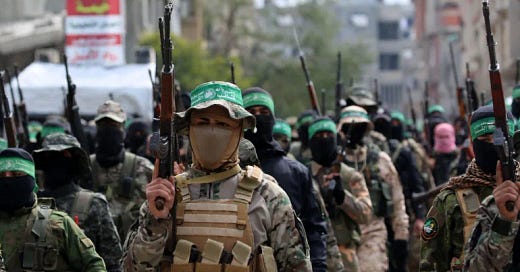Israel Pushes for Disarmament of Gaza Resistance – What Does International Law Say?
Many international experts emphasize that any discussion about disarmament must come only within the framework of a political solution that upholds the full rights of the Palestinian people
Palestine, PUREWILAYAH.COM - Israel is intensifying demands that Palestinian resistance groups in Gaza disarm as a precondition for any political agreement that could lead to an end to the ongoing war of genocide, now entering its 18th month.
These demands, which have been firmly rejected by resistance factions, are based on the Israeli narrative that the presence of weapons poses a direct threat to its national security.
Israel’s push for disarmament is seen as a strategy to strengthen its security position while politically stripping the resistance groups of their ability to use arms as a tool for self-determination and liberation.
This raises serious questions about the legitimacy of such demands, especially considering the vast military arsenal that Israel possesses, including uninterrupted supply chains since October 7, 2023.
The Right to Resist Under International Law
When examining the nature of the weapons that resistance groups are being asked to surrender, primarily light arms such as Kalashnikovs, anti-tank grenades, improvised explosives, and locally-made rockets, they pale in comparison to Israel’s strategic and operational military power. Thus, to claim these limited weapons threaten Israel’s security is a significant exaggeration, especially given its military backing from the U.S. and other Western allies.
According to international humanitarian law, particularly the Geneva Conventions and their Additional Protocols, peoples under occupation have the legal right to resist by all available means, including armed struggle—provided they adhere to the rules of international law, such as distinguishing between civilians and combatants and not deliberately targeting civilians.
The 1977 Additional Protocol I to the 1949 Geneva Conventions clearly states that “armed conflicts in which peoples are fighting against colonial domination and alien occupation and against racist regimes” are considered international armed conflicts.
This means that armed resistance against occupation is not only permissible but recognized as a legitimate means of pursuing freedom and independence. Therefore, Israel’s demand for disarmament as a precondition to a just political settlement directly contradicts this legal principle.
A Political Bargaining Tactic
Political analyst Ashraf Sahli argues that Israel’s insistence on disarmament is more of a political extortion tactic than a genuine security concern, especially considering the resistance’s limited military capabilities in comparison to Israel’s vast arsenal and record of disproportionate violence.
In his article titled “What is the resistance weapon that the Israeli occupation wants to remove from Gaza?”, Sahli explains that even if Israel has succeeded in weakening the resistance militarily to some extent, that doesn’t mean the resistance has lost its ability to endure or respond. While weakened, the resistance still stands as a force of deterrence and resilience.
He also stresses that the idea of disarming the resistance is entirely unfeasible—not just because it’s a non-negotiable right of the Palestinian people to defend themselves, but also because, technically, there isn’t a significant arsenal to be "disarmed" in the first place. The resistance uses simple, often homemade weapons that serve more as tools for survival than offensive threats.
The People Are the Real Weapon
Sahli adds that from Israel’s own flawed military logic, the resistance is already practically disarmed—at least on the surface. The weapons it has are defensive, limited, and mostly used tactically and sparingly. They may inflict real damage, but they are not capable of shifting the balance of power, nor are they enough to replicate large-scale operations like the “Al-Aqsa Flood” repeatedly.
So what does Israel really want to disarm?
According to Sahli, the true target of Israel’s disarmament campaign is not the weapons—it’s the Palestinian people themselves. Israel seeks either to remove them through forced displacement or annihilation, or both. That’s because the true strength of the resistance lies in the people: their will, their ingenuity, their commitment to survival and liberation. The weapons are small and modest, but the people behind them are what Israel truly fears.
International Law and the Palestinian Right to Self-Determination
The UN Charter affirms the right of all peoples under occupation to self-determination. Armed resistance to occupation is thus not only legal but considered a legitimate exercise of human rights.
Many international experts emphasize that any discussion about disarmament must come only within the framework of a political solution that upholds the full rights of the Palestinian people.
Francesca Albanese, the UN Special Rapporteur on the situation of human rights in the Palestinian territories, stressed the need to guarantee the Palestinian people their right to self-determination—including the right to exist as a people. She warned that Israel must not be allowed to continue its control over Gaza or maintain its occupation of the West Bank.
In an interview with Al-Araby Al-Jadeed, Albanese described Israel’s war on Gaza as “the most sadistic and militarized” since World War II. She highlighted the scale of the atrocities, with people being killed in dozens and hundreds within hours, stating, “Nothing is left.” (PW)
Source: Palinfo




